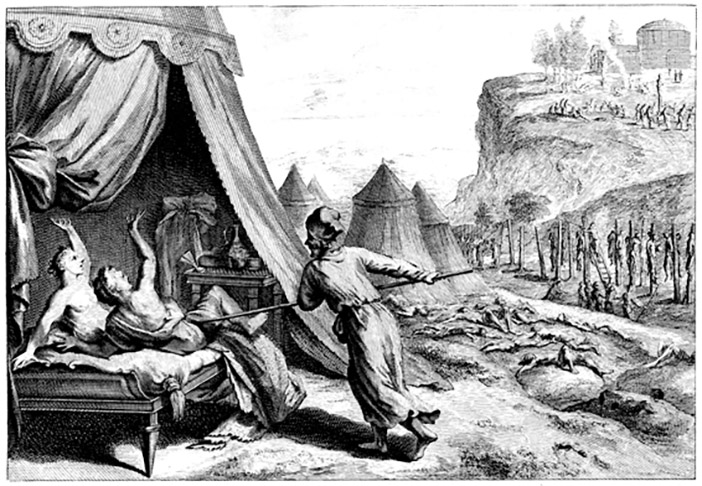The story of Pinḥas stands out in the Torah as one with exceptionally long-reaching implications for Jewish history. As Am Yisrael is crossing through the territories of Moav and Midian, many Israelite men, including the tribal leader of prince of Shimon, take up with foreign women who entice them to idolatry.
While Israel’s leaders know they must put a stop the debauchery, they remain inert, until Pinḥas – a grandson of Aharon – takes matters into his own hands. He enters the tent of Zimri the Shimonite prince and drives a spear through him and his Midianite consort, Kozbi, as they were cohabiting.
In response, HaShem conveys to Moshe that He is pleased with Pinḥas’s deed, extolling him for both taking up HaShem’s wrath and “turning back My wrath.” He grants Pinḥas a “covenant of peace… for all time.” The Medieval commentator Sforno notes that this “covenant of peace” was a guarantee of protection against death, granting Pinḥas exceptionally long life.
After the nation entered Eretz Yisrael, Pinḥas succeeded his father as the Kohen Gadol and held this position for centuries. Kabbalistic sources even record that Pinḥas merited eternal life, and that he and Eliyahu, the most zealous prophet during the era of the split kingdoms, are one and the same.
Opinions differ on whether Eliyahu was physically the same person as Pinḥas, or just inherited his neshama and his zeal, in order to play the same spiritual role in a later age, but the core message is a reiteration of the cyclical nature of Israel’s history. Just as tribes and nations hold spiritual forces that exist above and beyond time due to their primordial nature, so too individual souls play recurring parts in history.
Just as Pinḥas’s zeal redeemed the nation from utter destruction, and ushered in their successful entry into the land, Eliyahu also worked to redeem the nation from impending destruction due to idolatry. The parallel continues in their singling out of Israelite leaders taking foreign women (and thus foreign influence) as a source of the turn towards idolatry, a theme that repeats itself throughout Scripture.
There exists a third parallel as well, not in these zealous men’s actions, but in their potentials.
The Talmud, in Nedarim 22b, notes that had Am Yisrael not sinned, Yehoshua leading the people into the land would have been the final redemption, and the end of history as we know it.
Pinḥas, the presiding Kohen Gadol after the deaths of his father Elazar and Yehoshua, would have ushered in the Messianic age. Similarly, in reward for his zealous fight against idolatry in the land, Eliyahu was carried off in a fiery chariot to await his role in ushering in the Messianic era.
This link between zealotry in eradicating idolatry and ringing in the final redemption is not coincidental. The stories of Pinḥas and Eliyahu serve as guides for our own liberation. Redemption demands of us a deep devotion to HaShem and an unswerving commitment to Am Yisrael‘s historic mission.
This zealotry bears a high price. Like most of our greatest leaders throughout history, Pinḥas and his ideological successors were hated and ostracized in their own times. They were the radical minority upsetting the comfortable status quo, often at high immediate costs to themselves and even the nation.
The drought that Eliyahu brought upon the people in his fight against the Ba’al, the destruction and exile wrought against the nation in response to the Zealot movement and the Bar Kokhba revolt, and most recently the British crackdowns against Mandate Palestine’s Jewish population during the Leḥi’s zealous fight for freedom and redemption, each attest to the potential dangers of zealotry.
But the key to redemption lies in this twofold fight, against the idolatry of a given age (Pe’or, Ba’al, Greco-Roman culture, Western “civilization”) and against the influence of foreign empires on our people (Midian, Tzidon, Rome, Britain, etc.). May we merit to return this spirit of zealotry to our nation, and through it, restore Pinḥas/Eliyahu as the herald of our ultimate liberation.





